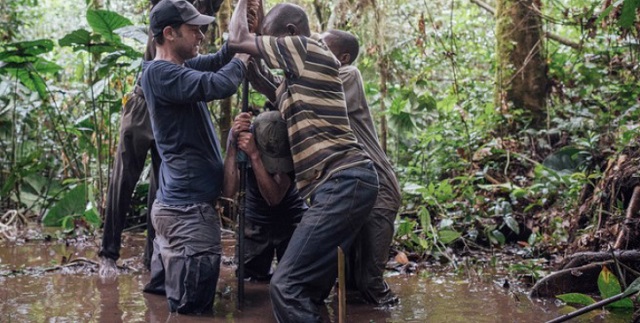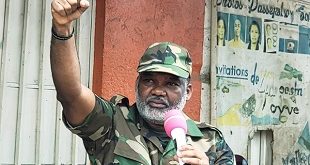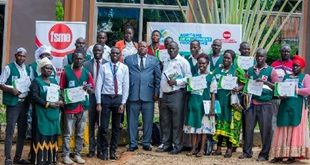
The Democratic Republic of Congo is opening parts of the world’s second-biggest rainforest to drilling following its offer on July 28 of licensing rights for 27 oil and three gas blocks in the region.
Initially, Kinshasa had planned to give away 16 oil blocks but it appears that with the war in Ukraine sharpening Western demands, it has decided to act quickly to cash in on the increased global interest in fossil fuels. It is now selling 240,000 square kilometres of oil refinery; which is an area about the size of Uganda.
Of the 27 oil blocks, three are located on the coast of the Congo River basin and nine in the huge “central basin” rainforest region in the west of the country. The other 15 are in the east of the country; two of these covering the Virunga National Park, a sanctuary for endangered mountain gorillas on the DR Congo borders with Uganda and Rwanda. The three methane gas blocks are in Lake Kivu.
Environmentalists and climate change activists immediately condemned the move saying drilling in the ecologically sensitive region will release large amounts of carbon into the atmosphere and lead to global warming.
Three of the blocks overlap with the Cuvette Centrale peatlands, a biodiversity hotspot containing about 30 gigatons of carbon, equivalent to three years of global emissions, according to Greenpeace Africa.
“In a zone where there are peatlands, any industrial exploitation means the explosion of a carbon bomb,” said Irène Wabiwa Betoko, who leads Greenpeace’s Congo Basin project, “The plan for big oil companies to trash Congo’s most sensitive ecosystems is a historic error that must be scrapped immediately.”
Other environmentalists, including Simon Lewis who is renowned researcher on DR Congo’s peatlands, estimate that drilling in the blocks proposed by the government could release up to 5.8 billion of tonnes of carbon, more than 14% of the world’s total greenhouse gas emissions in 2021.
But President Felix Tshisekedi who presided over the launch of bidding at a ceremony in the capital Kinshasa said oil and gas production would boost development in his country which is one of the world’s poorest countries. He said modern drilling methods and tight regulation would minimise the ecological impact.
France’s TotalEnergies was one of the oil majors at the event that featured mainly local companies. Reuters reported that TotalEnergies is not participating in the bidding and said other majors will likely stay away.
“The combination of environmental risks, regulatory uncertainty in the sector, the huge logistical challenges of highly remote exploration, and on top of it all Congo’s higher political risk premium, will likely make many majors unwilling to commit,” Reuters quoted Vincent Rouget, the Africa director at Control Risks, a London-based consultancy.
The DRC government says the country has 22 billion barrels of crude reserves and it is targeting production of 200,000 barrels per day. The country has the second largest crude oil reserves in central and southern Africa after Angola. Oil production in DRC is currently limited to 25,000 barrels per day, all of which is exported.
Previous efforts by Congolese governments to boost output beyond the roughly 25,000 barrels per day it has long produced along its Atlantic coast have run into the same challenges.
Oil majors including Total and Eni already have concessions in the Cuvette Centrale region, although no exploration has taken place so far. In 2019, Total’s CEO Patrick Pouyanné told local journalists the company was willing to undertake seismic surveys in the region to “help Congo to evaluate its resources”.
Campaigners say oil drilling in the DRC’s forests contradicts the government’s plan to become a “solution country” to climate change, by storing carbon in its forests and generating energy from hydropower in the Congo River and its tributaries.
But when Tosi Mpanu-Mpanu, an adviser to Presidential Tshisekedi, was asked whether DR Congo might forego drilling in exchange for compensation from richer countries, he was skeptical, according to Reuters.
He reportedly cited the example of Ecuador, which requested $3.6 billion in 2007 to offset revenue lost by not drilling in its Yasuni National Park. The initiative was scrapped in 2013 after it brought in less than 4% of the requested amount. Drilling began three years later.
In another report quoting Joe Eisen, executive director of the Rainforest Foundation UK, the recent developments in DRC’s forest sector have put international donors in an uncomfortable position. At the last round of UN climate talks, UK, South Korea, Norway and several EU member states pledged $500m over five years to protect the country’s forest through the Central African Forest Initiative (Cafi).
The deal with Cafi does not explicitly call for a ban in oil drilling in the peatlands but in protected areas where it is incompatible with conservation objectives.
The money further hinges on the publication of an analysis by the end of 2023 to determine the extent to which mining and oil concessions overlap with or impact protected areas and high-value forests and peatlands.
Eisen told Climate Home the prospect of oil drilling in DRC’s peatlands raised serious questions about the efficacy of the $500m forest protection agreement signed at Cop26 in Glasgow, UK.
“The DR Congo badly needs development but of a kind that benefits both people and the planet,” Eisen reportedly said. Congo is already a mining powerhouse, producing large amounts of copper, cobalt, gold, and diamonds, yet it remains deeply impoverished, due largely to corruption and misgovernance.
****
 The Independent Uganda: You get the Truth we Pay the Price
The Independent Uganda: You get the Truth we Pay the Price


